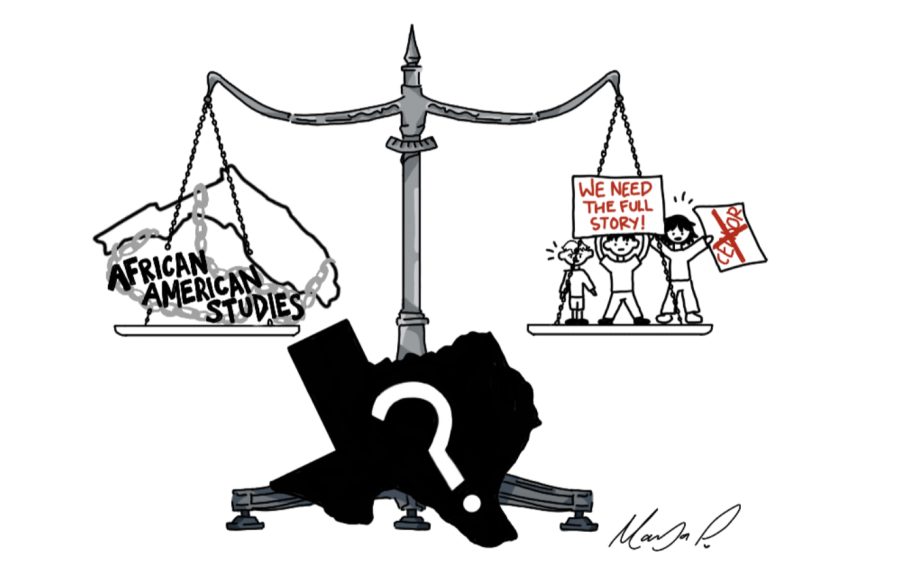Editorial: AP African American Studies curriculum should not be “cherry picked”
Florida announced its plan to block the pilot AP African American Studies course from being taught in its high schools. The Sidekick editorial board believes that either the whole course should be provided or it should not be an option statewide. Maya Palavali
April 3, 2023
The AP U.S. History course framework mentions the word “African(s)” 21 times, the phrase “African American” four times and the word “Black” once on a 291-page document.
AP World History: Modern features “African(s)” only four times and the words “African American” or “Black” are never featured in the 249-page document.
“American” however, appears 151 times on the APUSH document and three times on the WHAP framework.
But College Board has a way to broaden students’ perspectives and introduce them to a different part of AP history: the new AP African American Studies course.
College Board began developing the course during 2020 amid social justice uprisings. It sought to create a class where students would deeply engage with African American history, culture, movements and debates.
In January, Florida Governor Ron DeSantis blocked the new AP course from being taught in his state’s high schools. This was due to the inclusion of so-called “controversial” beliefs in texts from modern Black thought leaders and history teachers, whose writings, the DeSantis administration believes, violates state laws and imposes a political agenda upon students.
Completely banning the course from all high schools in Florida is not the appropriate solution. Students deserve to learn new perspectives and marginalized histories that are not as commonly taught in typical high school instruction. This new course is a way to learn that facet of history.
College Board is continuing to advocate for the new pilot course to high schools. It deserves a chance to implement the class.
The logic is on their side.
After Florida’s response to the new course, College Board released a lengthy statement where it condemned Florida’s ban of the course while also acknowledging its own mistakes with regards to the lack of clarity of the optional course material including contemporary topics like the Black Lives Matter movements.
It specifically targeted the Florida Department of Education and the DeSantis administration’s subsequent comments that African American Studies “lacks educational value” accepting that their “failure to raise [their] voice betrayed Black scholars everywhere and those who have long toiled to build this remarkable field.”
College Board went further on to criticize Florida’s effort to “engineer a political win” by “[claiming] credit for the specific changes [College Board] made to the official framework.” In fact, in a letter sent from Florida to the College Board, Florida expressed gratitude for the removal of 19 topics which they never asked the College Board to remove. Despite what the letter says, most of those topics remained in the framework.
Texas is acting similarly by filing a bill to ban any AP course that does not comply with the state’s anti-Critical Race Theory law. If the bill passes, Texas would be the only state to specifically target AP courses and test their compliance with state laws.
AP courses such as the AP Government and Politics course have been known to historically exclude ethnic studies. Coppell High School already offers an Honors African American studies course and based on current levels of participation, it appears that there is already a level of demand for a course that delves into Black history, culture and heritage.
Unless the bill is passed, CHS will offer the AP African American Studies course to its students sometime in the future. If the bill is passed, CHS would not be able to offer the course. History courses, including AP courses, tend to gloss over other parts of history, such as African American History, by explaining it through a Eurocentric lens, often ignoring the history of people of other cultures in the United States.
Offering this course would introduce students to a new viewpoint which would help them gain perspective on the world, and an appreciation and understanding for diversity. If the government does not allow for different viewpoints to be present in a school, it sets a bad precedent for future generations and governments.
But the problem is not a simple one and requires a more complex solution from the overarching organization. College Board needs to show its dedication and level of commitment to truly teaching students about Black history and culture by not changing the “controversial” curriculum for states across the board.
Allowing for feedback and constructive criticism is one thing. However, removing or allowing contemporary topics that are likely to be highly interesting and relevant for students to be made optional in the pilot course is a separate issue.
By bending to the pressure from the government, it sets the precedent that people have the ability to bend the rules and curriculum. Considering the problems that would arise with AP testing if the curriculum was to be changed on a per state basis, College Board should pursue an “all or nothing” policy. Either states adopt the new course and implement it in schools, or they don’t implement the course at all.
State governing officials should not be allowed to pick and choose the content they want to teach students.
Follow @CHSCampusNews on Twitter.











